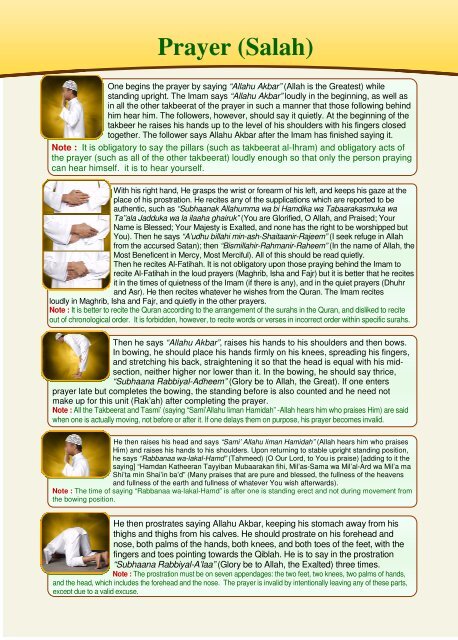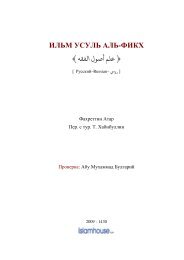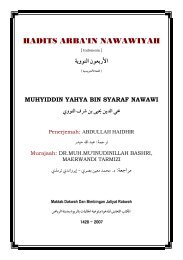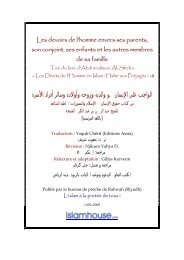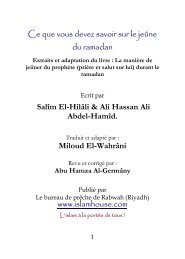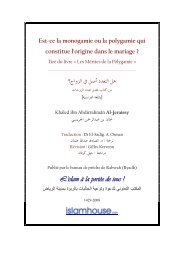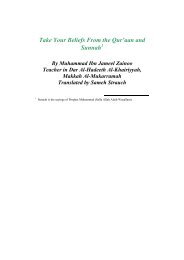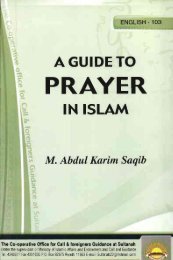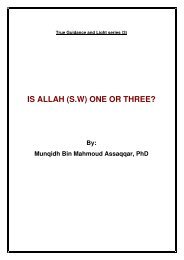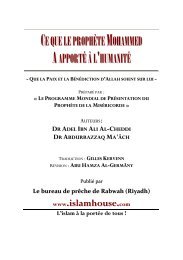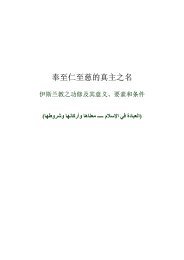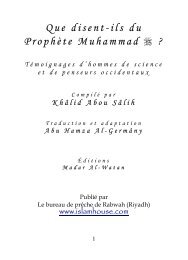are there? - Islam Center
are there? - Islam Center
are there? - Islam Center
Create successful ePaper yourself
Turn your PDF publications into a flip-book with our unique Google optimized e-Paper software.
Prayer (Salah)<br />
One begins the prayer by saying “Allahu Akbar” (Allah is the Greatest) while<br />
standing upright. The Imam says “Allahu Akbar” loudly in the beginning, as well as<br />
in all the other takbeerat of the prayer in such a manner that those following behind<br />
him hear him. The followers, however, should say it quietly. At the beginning of the<br />
takbeer he raises his hands up to the level of his shoulders with his fingers closed<br />
together. The follower says Allahu Akbar after the Imam has finished saying it.<br />
Note : It is obligatory to say the pillars (such as takbeerat al-Ihram) and obligatory acts of<br />
the prayer (such as all of the other takbeerat) loudly enough so that only the person praying<br />
can hear himself. it is to hear yourself.<br />
With his right hand, He grasps the wrist or forearm of his left, and keeps his gaze at the<br />
place of his prostration. He recites any of the supplications which <strong>are</strong> reported to be<br />
authentic, such as “Subhaanak Allahumma wa bi Hamdika wa Tabaarakasmuka wa<br />
Ta’’ala Jadduka wa la ilaaha ghairuk” (You <strong>are</strong> Glorified, O Allah, and Praised; Your<br />
Name is Blessed; Your Majesty is Exalted, and none has the right to be worshipped but<br />
You). Then he says “A’udhu billahi min-ash-Shaitaanir-Rajeem” (I seek refuge in Allah<br />
from the accursed Satan); then “Bismillahir-Rahmanir-Raheem” (In the name of Allah, the<br />
Most Beneficent in Mercy, Most Merciful). All of this should be read quietly.<br />
Then he recites Al-Fatihah. It is not obligatory upon those praying behind the Imam to<br />
recite Al-Fatihah in the loud prayers (Maghrib, Isha and Fajr) but it is better that he recites<br />
it in the times of quietness of the Imam (if <strong>there</strong> is any), and in the quiet prayers (Dhuhr<br />
and Asr). He then recites whatever he wishes from the Quran. The Imam recites<br />
loudly in Maghrib, Isha and Fajr, and quietly in the other prayers.<br />
Note : It is better to recite the Quran according to the arrangement of the surahs in the Quran, and disliked to recite<br />
out of chronological order. It is forbidden, however, to recite words or verses in incorrect order within specific surahs.<br />
<br />
Then he says “Allahu Akbar”, raises his hands to his shoulders and then bows.<br />
In bowing, he should place his hands firmly on his knees, spreading his fingers,<br />
and stretching his back, straightening it so that the head is equal with his midsection,<br />
neither higher nor lower than it. In the bowing, he should say thrice,<br />
“Subhaana Rabbiyal-Adheem” (Glory be to Allah, the Great). If one enters<br />
prayer late but completes the bowing, the standing before is also counted and he need not<br />
make up for this unit (Rak’ah) after completing the prayer.<br />
Note : All the Takbeerat and Tasmi’ (saying “Sami’Allahu liman Hamidah” -Allah hears him who praises Him) <strong>are</strong> said<br />
when one is actually moving, not before or after it. If one delays them on purpose, his prayer becomes invalid.<br />
<br />
<br />
<br />
<br />
<br />
<br />
<br />
<br />
<br />
He then raises his head and says “Sami’ Allahu liman Hamidah” (Allah hears him who praises<br />
Him) and raises his hands to his shoulders. Upon returning to stable upright standing position,<br />
he says “Rabbanaa wa-lakal-Hamd” (Tahmeed) (O Our Lord, to You is praise) [adding to it the<br />
saying] “Hamdan Katheeran Tayyiban Mubaarakan fihi, Mil’as-Sama wa Mil’al-Ard wa Mil’a ma<br />
Shi’ta min Shai’in ba’d” (Many praises that <strong>are</strong> pure and blessed, the fullness of the heavens<br />
and fullness of the earth and fullness of whatever You wish afterwards).<br />
Note : The time of saying “Rabbanaa wa-lakal-Hamd” is after one is standing erect and not during movement from<br />
the bowing position.<br />
He then prostrates saying Allahu Akbar, keeping his stomach away from his<br />
thighs and thighs from his calves. He should prostrate on his forehead and<br />
nose, both palms of the hands, both knees, and both toes of the feet, with the<br />
fingers and toes pointing towards the Qiblah. He is to say in the prostration<br />
“Subhaana Rabbiyal-A’laa” (Glory be to Allah, the Exalted) three times.<br />
Note : The prostration must be on seven appendages: the two feet, two knees, two palms of hands,<br />
and the head, which includes the forehead and the nose. The prayer is invalid by intentionally leaving any of these parts,<br />
except due to a valid excuse.


